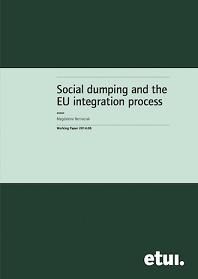Wren-Lewis, S. (2014) “The mythical Phillips curve?“, Mainly Macro Blog, 14 Οκτωβρίου. Suppose you had just an hour to teach the basics of macroeconomics, what relationship would you be sure to include? My answer would be the Phillips curve. With the Phillips curve you can go a long way to understanding what monetary policy is all about. My faith in the Phillips curve comes from simple but highly plausible …Read More
Maximising happiness does not maximise welfare
Glaeser, Ε., Gottlieb, J. & Ziv, O. (2014) “Maximising happiness does not maximise welfare“, VoxEU Organisation, 15 Οκτωβρίου. Governments are now measuring happiness, or subjective wellbeing, and some have begun trying to maximise it. This column discusses recent research showing that happiness is not the same thing as utility. The choices people make suggest that they have desires and objectives other than happiness. It is therefore possible to make …Read More
The sources of firms’ success
Hottman, C., Redding, S. & Weinstein, E. D. (2014) “The sources of firms’ success“, VoxEU Organisation, 14 Οκτωβρίου. Recent research highlights that important factors for firm size are costs, quality, markups, and product scope. This column explores the sources that make these factors differ across firms. Quality and in particular, variation in the product scope, is the chief determinant of firm sales. Marginal cost variations do not matter much …Read More
Southern Europe and the Financial Earthquake – Coping with the First Phase of the International Crisis
Verney, S., Bosco, A. & Lobo, M. C. (Eds.) (2014) “Southern Europe and the Financial Earthquake – Coping with the First Phase of the International Crisis“, South European Society and Politics, Routledge Publications, Οκτώβριος. Following the outbreak of the international financial crisis, Southern Europe became an epicentre of economic instability and international concern. The prospect of a sovereign debt default in the eurozone’s ‘flaky fringe’ sent shock waves through …Read More
Law And Solidarity: Reflections On August 1914
Deakin, S. (2014) “Law And Solidarity: Reflections On August 1914“, Social Europe Journal, 13 Οκτωβρίου. On the occasion of the centenary of the outbreak of the war in Europe, it is my great privilege to give this address to the graduating Masters class of 2014, and to continue the historic ties between Cambridge and Louvain. A century ago, our two universities stood in solidarity against the common threat of …Read More
Mapping youth transitions in Europe
Eurofound (2014) Mapping youth transitions in Europe, Publications Office of the European Union: Luxembourg, 14 Οκτωβρίου. Young people in Europe continue to experience great difficulties in entering the labour market. Although the youth unemployment rate in a few Member States has started to fall, overall 23% of young European job-seekers aged 15–24 could not find a job in January 2014. In 2012, 14.6 million young people across Europe were …Read More
Social Dumping and EU Integration Process
Bernaciak, M. (2014) “Social Dumping and EU Integration Process“, European Trade Union Institute (ETUI), Working Paper 2014.06, 14 Οκτωβρίου. Abstract This paper proposes a conceptualization of social dumping and applies it to an analysis of the EU integration process. Building on recent contributions in the fields of economic theory, economic sociology and institutional political economy, it defines social dumping as the practice, undertaken by self-interested market participants, of undermining …Read More
The great mortgaging
Jordà, Ο., Taylor, A. & Schularick, M. (2014) “The great mortgaging“, VoxEU Organisation, 12 Οκτωβρίου. The Global Crisis prompted Lord Adair Turner to ask if the growth of the financial sector has been socially useful, catalysing an ongoing debate. This column turns to economic history to investigate whether the financial sector is too big. New long-run, disaggregated data on banks’ balance sheets show that mortgage lending by banks has …Read More
A New Age Of IMF Bailouts – Great Britain In The 1970s
Tavares, E. M. (2014) “A New Age Of IMF Bailouts – Great Britain In The 1970s“, ΘZeroHedge, 12 Οκτωβρίου. Hearing of IMF interventions generally conjures up images of developing nations (and the occasional Eurozone peripheral economy of late) facing some kind of financial difficulty. But it was actually Great Britain, the cradle of the industrialized world, which in 1976 became one of the first countries ever to be “bailed …Read More
Fighting Deflation: Would QE work in the euro area?
Gros, D. (2014) “Fighting Deflation: Would QE work in the euro area?“, Economic Policy, CEPS Commentaries, 09 Οκτωβρίου. With inflation in the eurozone stubbornly remaining on a downward trajectory, pressure is growing on the ECB to do “something” to prevent outright deflation. But, given the financial structure of eurozone countries, would the preferred “something” – quantitative easing – actually do the trick? Σχετικές αναρτήσεις: Wyplosz, C. (2014) “Is …Read More









